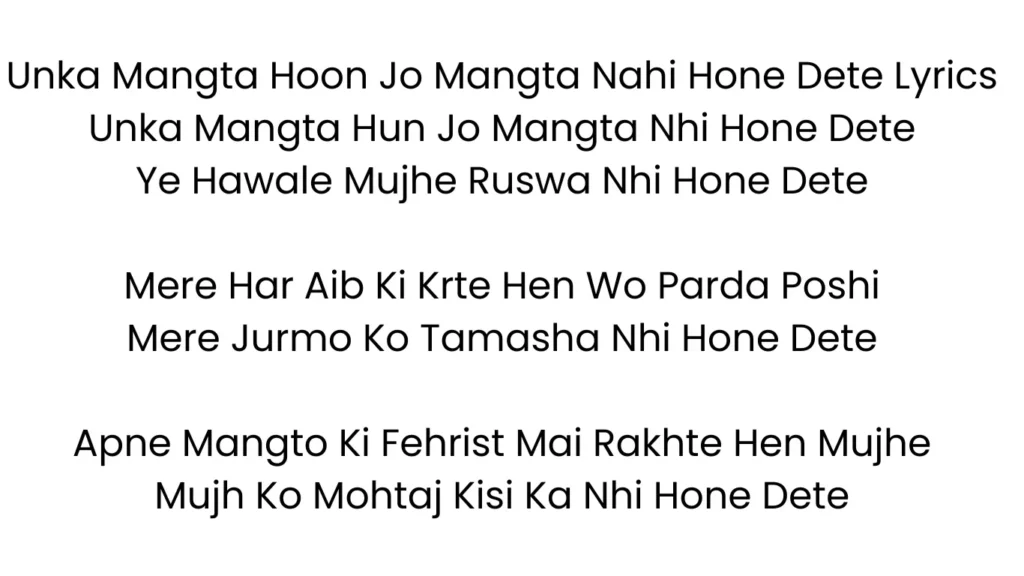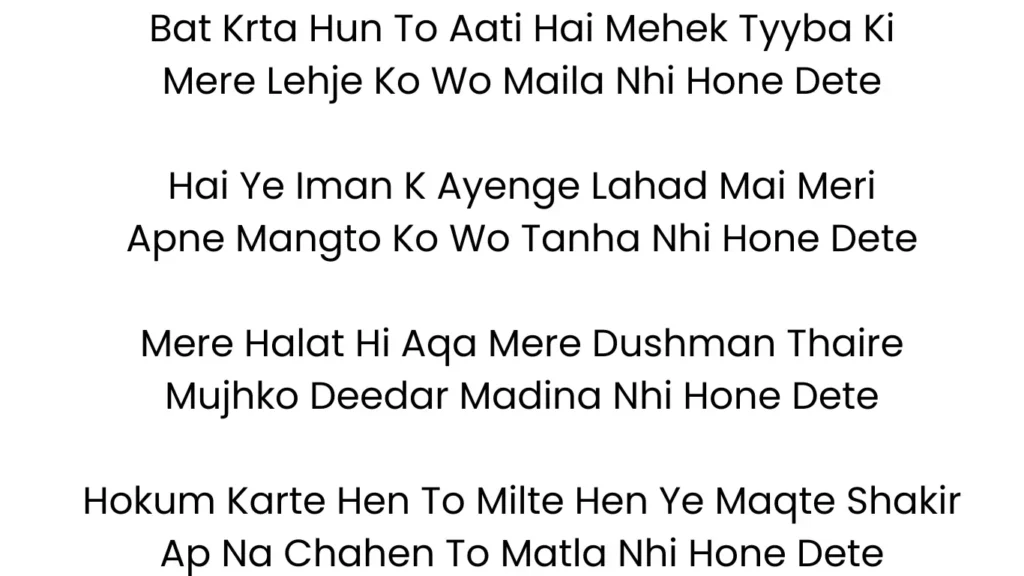The beautiful naat Unka Mangta Hoon by the renowned poet resonates deeply with the emotions of love, faith, and reliance on the Prophet Muhammad (PBUH). Each verse reflects profound gratitude and spiritual connection, making it a timeless masterpiece for naat enthusiasts.
Let’s dive into the lyrics and understand their meanings while emphasizing their spiritual and emotional impact.
| Main Madine Chala Main Madine Chala Naat |
| Sukoon Paya hai Bekasi ne Lyrics |
| A Beautiful Naat- Wo Mera Nabi Hai Lyrics |
| Dekhne Ko Ya Muhammad Naat Lyrics |
Verse-by-Verse Analysis
1. Unka Mangta Hoon Jo Mangta Nahi Hone Dete
The opening verse sets a powerful tone, expressing the poet’s pride and humility in being a devotee of the Prophet Muhammad (PBUH). The phrase “Jo Mangta Nahi Hone Dete” signifies the unparalleled mercy and grace of the Prophet, who ensures that his followers are never left helpless.
2. Ye Hawale Mujhe Ruswa Nahi Hone Dete
Here, the poet emphasizes the protection granted by the Prophet’s intercession. The word “Hawale” reflects a sense of trust and reliance, indicating that believers are safeguarded from disgrace under his spiritual care.
3. Mere Har Aib Ki Krte Hen Wo Parda Poshi
This verse highlights the Prophet’s compassion in concealing the flaws of his followers. The term “Parda Poshi” signifies the covering of sins, showcasing his role as a shield for the imperfections of his ummah (followers).
4. Mere Jurmo Ko Tamasha Nahi Hone Dete
The poet continues by expressing gratitude for the Prophet’s protection, ensuring that one’s faults do not become public spectacles. This speaks to the mercy and understanding extended by the Prophet.
5. Apne Mangto Ki Fehrist Mai Rakhte Hen Mujhe
This line reflects the immense honor of being included among the Prophet’s devotees. The use of “Fehrist” symbolizes a sense of belonging and acceptance into a sacred community.
6. Mujh Ko Mohtaj Kisi Ka Nahi Hone Dete
Through this verse, the poet acknowledges that devotion to the Prophet grants self-sufficiency. The phrase “Mohtaj Kisi Ka Nahi” implies independence derived from spiritual richness.
7. Bat Krta Hun To Aati Hai Mehek Tyyba Ki
This beautifully crafted line paints an imagery of Medina’s fragrance enveloping the poet during conversations. It reflects the spiritual connection that manifests even in mundane activities.
8. Mere Lehje Ko Wo Maila Nahi Hone Dete
Here, the poet credits the Prophet’s influence for keeping his speech pure and meaningful. The word “Maila” emphasizes spiritual cleanliness and purity.
9. Hai Ye Iman K Ayenge Lahad Mai Meri
The poet expresses unwavering faith that the Prophet will come to his grave. This verse encapsulates hope and reassurance in the afterlife, a sentiment cherished by Muslims.
10. Apne Mangto Ko Wo Tanha Nahi Hone Dete
This line continues the theme of companionship, illustrating that the Prophet ensures his followers are never left alone, especially in moments of vulnerability.
11. Mere Halat Hi Aqa Mere Dushman Thaire
The poet acknowledges his struggles but trusts that his association with the Prophet protects him from adversaries. This verse conveys resilience and hope in difficult times.
12. Mujhko Deedar Madina Nahi Hone Dete
This poignant line reflects the yearning for Medina, the city of the Prophet. The poet’s longing underscores the spiritual magnetism of Medina for Muslims worldwide.
13. Hokum Karte Hen To Milte Hen Ye Maqte Shakir
The poet concludes with a note of submission and gratitude. The phrase “Hokum Karte Hen” symbolizes the authority and blessings granted by the Prophet.
14. Ap Na Chahen To Matla Nahi Hone Dete
Ending with a humbling statement, the poet acknowledges that all blessings are by the Prophet’s will, solidifying the theme of reliance and devotion.


Themes in the Naat
- Devotion and Love: The poet expresses profound devotion to the Prophet Muhammad (PBUH), showcasing an unwavering bond.
- Gratitude: Each verse is a testament to the gratitude for the Prophet’s mercy and blessings.
- Hope and Faith: The naat reflects hope in the afterlife and faith in the Prophet’s intercession.
- Protection and Guidance: A recurring theme is the protection offered by the Prophet to his followers in all aspects of life.
The Spiritual Significance of Naat | Unka Mangta hoon naat lyrics
The Role of Naat in Islamic Culture: Naat plays a vital role in expressing love for the Prophet Muhammad (PBUH) and inspiring spirituality.
- Significance of Devotion to the Prophet: Belief in the Prophet’s intercession is a cornerstone of Islamic faith.
- Impact of Medina on Muslim Hearts: The city of Medina remains a symbol of peace and hope for millions of Muslims.
FAQs:
This line means, “I am a devotee of the one who ensures that his devotees are never left wanting.” It signifies the Prophet’s care and mercy for his followers.
The naat resonates deeply because of its heartfelt lyrics that reflect love, devotion, and reliance on the Prophet Muhammad (PBUH).
The naat explores themes like gratitude, protection, hope, faith, and the spiritual connection with the Prophet.
Conclusion
unka mangta hoon naat lyrics is more than a naat; it is a poetic expression of love, faith, and reliance on the Prophet Muhammad (PBUH). Its deep themes and meaningful lyrics make it a source of inspiration for listeners. By exploring its verses, we uncover a spiritual journey that uplifts and connects the soul to divine love.




